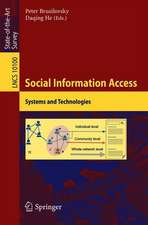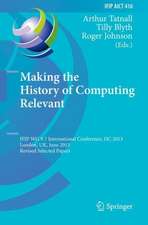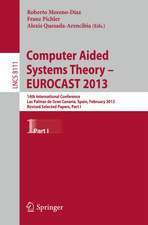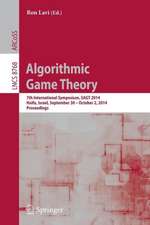User Modeling 2003: 9th International Conference, UM 2003, Johnstown, PA, USA, June 22-26, 2003, Proceedings: Lecture Notes in Computer Science, cartea 2702
Editat de Peter Brusilovsky, Albert Corbett, Firoella de Rosisen Limba Engleză Paperback – 5 iun 2003
Din seria Lecture Notes in Computer Science
- 20%
 Preț: 1061.55 lei
Preț: 1061.55 lei - 20%
 Preț: 307.71 lei
Preț: 307.71 lei - 20%
 Preț: 438.69 lei
Preț: 438.69 lei - 20%
 Preț: 645.28 lei
Preț: 645.28 lei -
 Preț: 410.88 lei
Preț: 410.88 lei - 15%
 Preț: 580.46 lei
Preț: 580.46 lei - 17%
 Preț: 427.22 lei
Preț: 427.22 lei - 20%
 Preț: 596.46 lei
Preț: 596.46 lei -
 Preț: 381.21 lei
Preț: 381.21 lei - 20%
 Preț: 353.50 lei
Preț: 353.50 lei - 20%
 Preț: 1414.79 lei
Preț: 1414.79 lei - 20%
 Preț: 309.90 lei
Preț: 309.90 lei - 20%
 Preț: 583.40 lei
Preț: 583.40 lei - 20%
 Preț: 1075.26 lei
Preț: 1075.26 lei - 20%
 Preț: 310.26 lei
Preț: 310.26 lei - 20%
 Preț: 655.02 lei
Preț: 655.02 lei - 20%
 Preț: 580.93 lei
Preț: 580.93 lei - 20%
 Preț: 340.32 lei
Preț: 340.32 lei - 15%
 Preț: 438.59 lei
Preț: 438.59 lei - 20%
 Preț: 591.51 lei
Preț: 591.51 lei - 20%
 Preț: 649.49 lei
Preț: 649.49 lei - 20%
 Preț: 337.00 lei
Preț: 337.00 lei -
 Preț: 449.57 lei
Preț: 449.57 lei - 20%
 Preț: 607.39 lei
Preț: 607.39 lei - 20%
 Preț: 1024.44 lei
Preț: 1024.44 lei - 20%
 Preț: 579.30 lei
Preț: 579.30 lei - 20%
 Preț: 763.23 lei
Preț: 763.23 lei - 20%
 Preț: 453.32 lei
Preț: 453.32 lei - 20%
 Preț: 575.48 lei
Preț: 575.48 lei - 20%
 Preț: 585.88 lei
Preț: 585.88 lei - 20%
 Preț: 825.93 lei
Preț: 825.93 lei - 20%
 Preț: 763.23 lei
Preț: 763.23 lei - 17%
 Preț: 360.19 lei
Preț: 360.19 lei - 20%
 Preț: 1183.14 lei
Preț: 1183.14 lei - 20%
 Preț: 340.32 lei
Preț: 340.32 lei - 20%
 Preț: 504.57 lei
Preț: 504.57 lei - 20%
 Preț: 369.12 lei
Preț: 369.12 lei - 20%
 Preț: 583.40 lei
Preț: 583.40 lei - 20%
 Preț: 343.62 lei
Preț: 343.62 lei - 20%
 Preț: 350.21 lei
Preț: 350.21 lei - 20%
 Preț: 764.89 lei
Preț: 764.89 lei - 20%
 Preț: 583.40 lei
Preț: 583.40 lei -
 Preț: 389.48 lei
Preț: 389.48 lei - 20%
 Preț: 341.95 lei
Preț: 341.95 lei - 20%
 Preț: 238.01 lei
Preț: 238.01 lei - 20%
 Preț: 538.29 lei
Preț: 538.29 lei
Preț: 340.32 lei
Preț vechi: 425.40 lei
-20% Nou
Puncte Express: 510
Preț estimativ în valută:
65.12€ • 67.29$ • 54.17£
65.12€ • 67.29$ • 54.17£
Carte tipărită la comandă
Livrare economică 19 martie-02 aprilie
Preluare comenzi: 021 569.72.76
Specificații
ISBN-13: 9783540403814
ISBN-10: 3540403817
Pagini: 456
Ilustrații: XIV, 442 p.
Dimensiuni: 155 x 233 x 24 mm
Greutate: 0.64 kg
Ediția:2003
Editura: Springer Berlin, Heidelberg
Colecția Springer
Seriile Lecture Notes in Computer Science, Lecture Notes in Artificial Intelligence
Locul publicării:Berlin, Heidelberg, Germany
ISBN-10: 3540403817
Pagini: 456
Ilustrații: XIV, 442 p.
Dimensiuni: 155 x 233 x 24 mm
Greutate: 0.64 kg
Ediția:2003
Editura: Springer Berlin, Heidelberg
Colecția Springer
Seriile Lecture Notes in Computer Science, Lecture Notes in Artificial Intelligence
Locul publicării:Berlin, Heidelberg, Germany
Public țintă
ResearchCuprins
Abstracts of Invited Talks.- Adaptive Interfaces for Ubiquitous Web Access.- Computers That Recognize and Respond to User Emotion.- The Advantages of Explicitly Representing Problem Spaces.- Adaptive Hypermedia.- The Three Layers of Adaptation Granularity.- Adaptive Presentation of Multimedia Interface Case Study: “Brain Story” Course.- Discovering Prediction Rules in AHA! Courses.- Adaptive Web.- Word Weighting Based on User’s Browsing History.- SNIF-ACT: A Model of Information Foraging on the World Wide Web.- Adapting to the User’s Internet Search Strategy.- Learning a Model of a Web User’s Interests.- Modelling Users’ Interests and Needs for an Adaptive Online Information System.- Declarative Specifications for Adaptive Hypermedia Based on a Semantic Web Approach.- Natural Language and Dialog.- Emotional Dialogs with an Embodied Agent.- Evaluating a Model to Disambiguate Natural Language Parses on the Basis of User Language Proficiency.- Incorporating a User Model into an Information Theoretic Framework for Argument Interpretation.- Using Dialogue Games to Maintain Diagnostic Interactions.- Plan Recognition.- Extending Plan Inference Techniques to Recognize Intentions in Information Graphics.- Leveraging Collaborative Effort to Infer Intent.- Plan Recognition to Aid the Visually Impaired.- Evaluation.- Performance Evaluation of User Modeling Servers under Real-World Workload Conditions.- Evaluating the Inference Mechanism of Adaptive Learning Systems.- The Continuous Empirical Evaluation Approach: Evaluating Adaptive Web-Based Courses.- Emerging Issues of User Modeling.- Privacy Preservation Improvement by Learning Optimal Profile Generation Rate.- Interfaces for Eliciting New User Preferences in Recommender Systems.- Modeling Multitasking Users.- VlUM, aWeb-Based Visualisation of Large User Models.- A Multiagent Approach to Obtain Open and Flexible User Models in Adaptive Learning Communities.- A Model for Integrating an Adaptive Information Filter Utilizing Biosensor Data to Assess Cognitive Load.- Ontology-Based User Modeling for Knowledge Management Systems.- Group Modeling and Cooperation.- Motivating Cooperation on Peer to Peer Networks.- Discourse Analysis Techniques for Modeling Group Interaction.- Group Decision Making through Mediated Discussions.- Modeling Task-Oriented Discussion Groups.- Modeling the Multiple People That Are Me.- Applications.- Iems: Helping Users Manage Email.- Modelling Reputation in Agent-Based Marketplaces to Improve the Performance of Buying Agents.- Customising the Interaction with Configuration Systems.- Does Adapted Information Help Patients with Cancer?.- Empirical Evaluation of Adaptive User Modeling in a Medical Information Retrieval Application.- Multivariate Preference Models and Decision Making with the MAUT Machine.- Student Modeling Methods.- Predicting Student Help-Request Behavior in an Intelligent Tutor for Reading.- A Comparative Analysis of Cognitive Tutoring and Constraint-Based Modeling.- Assessing Student Proficiency in a Reading Tutor That Listens.- Adaptive Bayes for a Student Modeling Prediction Task Based on Learning Styles.- User Modeling and Problem-Space Representation in the Tutor Runtime Engine.- A Neuro-fuzzy Approach in Student Modeling.- Learning Environments: Natural Language and Pedagogy.- Student Modeling for an Intelligent Agent in a Collaborative Learning Environment.- A Teaching Model Exploiting Cognitive Conflict Driven by a Bayesian Network.- Towards Intelligent Agents for Collaborative Learning: Recognizing the Roles of Dialogue Participants.- Modeling Student Performance to Enhance the Pedagogy of AutoTutor.- Modeling Hinting Strategies for Geometry Theorem Proving.- Mobile and Ubiquitous Computing.- User Modelling in the Car.- User Modelling and Mobile Learning.- D-ME: Personal Interaction in Smart Environments.- A User Modeling Markup Language (UserML) for Ubiquitous Computing.- Purpose-Based User Modelling in a Multi-agent Portfolio Management System.- User Modeling in Adaptive Audio-Augmented Museum Environments.- Doctoral Consortium Papers.- MAPS: Dynamic Scaffolding for Independence for Persons with Cognitive Impairments.- Adaptations of Multimodal Content in Dialog Systems Targeting Heterogeneous Devices.- Learning Knowledge Rich User Models from the Semantic Web.- Modeling User Navigation.- A Longitudinal, Naturalistic Study of Information Search & Use Behavior as Implicit Feedback for User Model Construction & Maintenance.- Facilitating the Comprehension of Online Learning Courses with Adaptivity.- Scrutable User Models in Decentralised Adaptive Systems.- A Pseudo-Supervised Approach to Improve a Recommender Based on Collaborative Filtering.- Visualizing a User Model for Educational Adaptive Information Retrieval.















